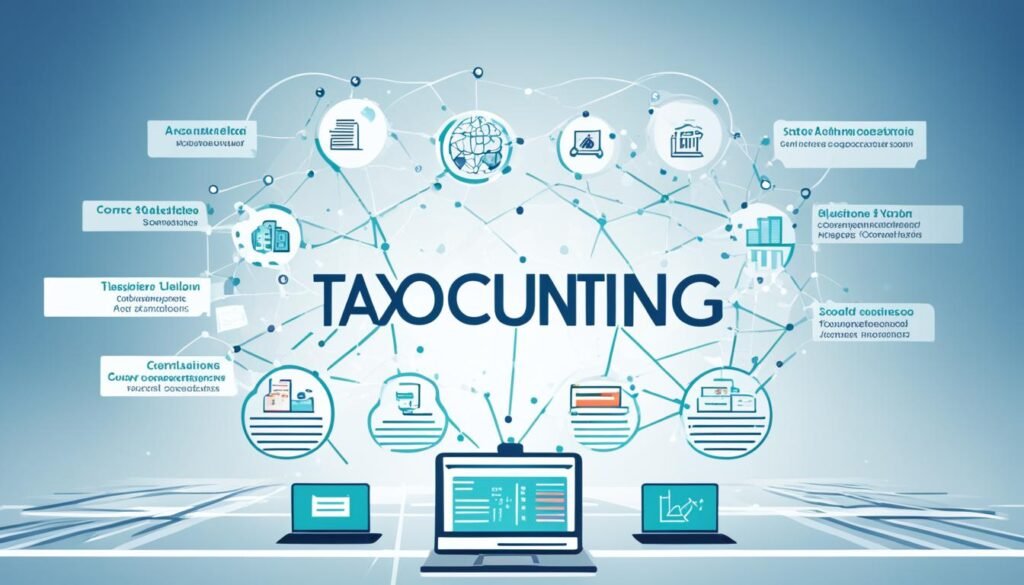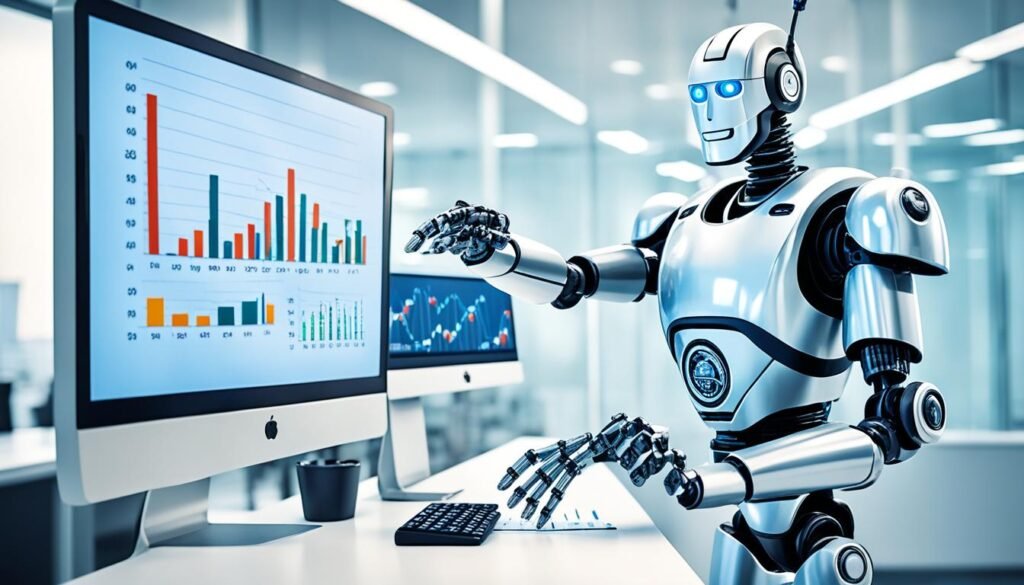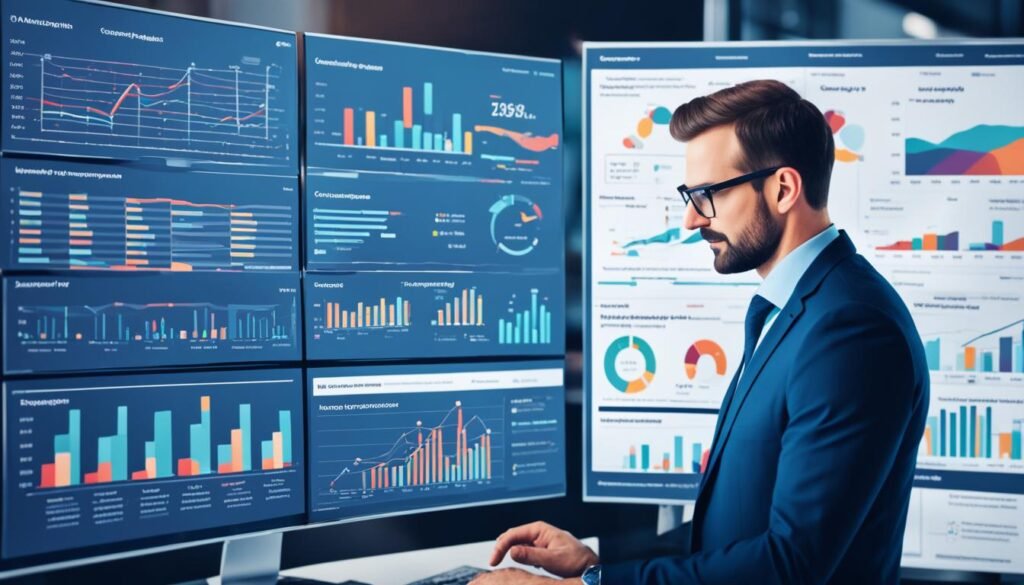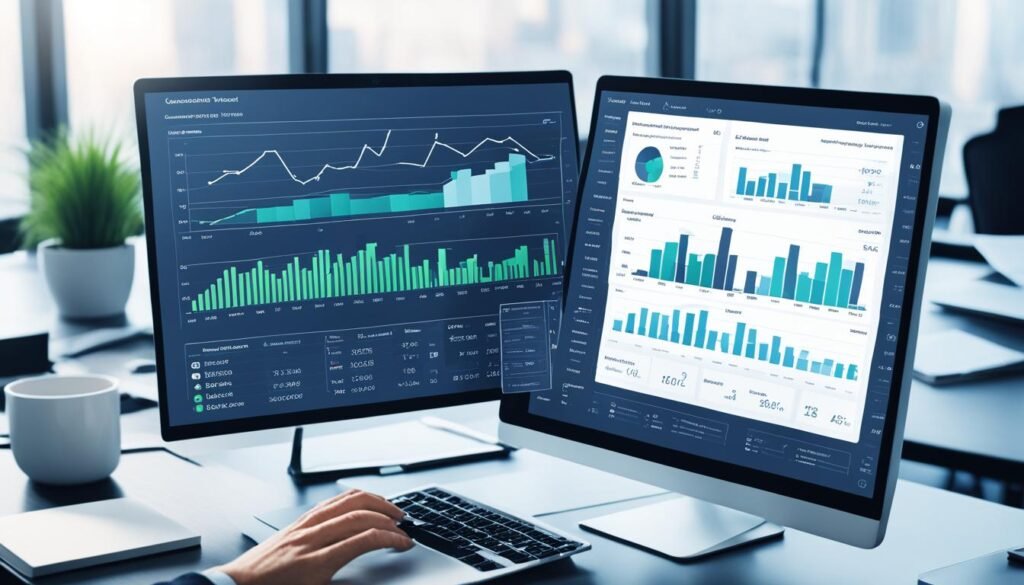Artificial intelligence (AI) is changing the game in many fields, including tax and accounting. By 2023, AI has become key for tax and accounting experts. It helps make tasks easier, more accurate, and lets pros focus on important work. AI has changed how we handle routine tasks, analyze data, and manage risks in accounting, auditing, and taxation. In this post we discuss the impact of AI on Accounting, Auditing and Taxation.
Key Takeaways
- AI has streamlined operations and enhanced accuracy in accounting, auditing, and tax preparation processes.
- AI-powered data analysis and forecasting tools enable professionals to make more informed decisions and offer valuable insights to their clients.
- AI has improved compliance and risk management by automating the monitoring of regulatory changes and detecting irregularities.
- AI has transformed the audit process by analyzing vast amounts of financial data and providing real-time insights.
- AI-powered client services have improved overall client experience through chatbots, virtual assistants, and customized reports.
Introduction to AI in Tax and Accounting
The tax and accounting world is quickly adopting AI technology. This change is making tasks faster, data analysis easier, and helping spot patterns. It also cuts down on mistakes and keeps up with new rules.
What is AI?
AI is a technology that lets computers learn and solve problems like humans do. It uses data to get smarter, the more data it has.
AI Subsets: Machine Learning, Generative AI, and Large Language Models
AI includes machine learning, generative AI, and large language models. Machine learning helps systems learn from lots of data to predict and find patterns. Generative AI creates new things like images or text from data patterns. Large language models (LLMs) learn from lots of text to understand and respond like humans.
| AI Subset | Description |
|---|---|
| Machine Learning | Enables systems to analyze large amounts of data to learn, make predictions, and identify patterns and anomalies. |
| Generative AI | Uses patterns in data to create something new, such as images, text, or software code. |
| Large Language Models | Learns from vast volumes of text, allowing computers to understand and generate human-like text responses. |

“The tax and accounting sector is experiencing a rapid increase in the use of artificial intelligence (AI) technology.”
Automation of Routine Tasks
AI has changed the game in tax and accounting by automating routine tasks. Before, tax pros spent a lot of time on things like data entry and processing invoices. Now, with AI-powered software, these tasks are automated. This means pros can spend more time on important work.
AI-powered software can quickly and accurately handle big data, cutting down on mistakes. A recent study found that AI can automate 42% of finance tasks. This lets accountants work on strategies for business growth.
- The Artificial Intelligence in accounting market was worth USD 0.87 billion last year and is growing fast, reaching USD 11.0 billion in five years.
- 72% of accounting professionals think AI will grow in the next three years.
- AI-driven invoice management systems make processing invoices safer by automating data extraction.
- APIs help different software systems talk to each other, cutting down on manual errors.
Using automation in finance and AI accounting software, tax and accounting pros can make their work more efficient. They can give their clients better service and value.
“AI is freeing accountants from routine tasks, allowing them to deliver more value, better service, and focus on business growth and success.”

Enhanced Data Analysis and Forecasting
Artificial intelligence (AI) has changed how tax and accounting pros work with data. It brings real-time insights and predictive powers that were hard to get before. This helps firms make better decisions.
Real-time Insights and Predictive Analytics
AI can quickly go through huge amounts of financial data. It finds patterns, oddities, and trends that humans might miss. This lets pros make smarter, quicker decisions. They can improve financial performance and give great insights to clients.
AI tools look at data from different places like bank statements and invoices. They use machine learning to find hidden chances and areas to get better.
Identifying Patterns, Anomalies, and Trends
- AI can predict future financial trends by looking at past data and market conditions. This helps firms plan better.
- Advanced algorithms spot suspicious transactions or oddities. This boosts fraud detection and makes compliance stronger.
- Predictive analytics in accounting make forecasting, budgeting, and planning more accurate. This lets firms make decisions based on data.
The mix of ai data analytics, predictive analytics in accounting, and ai fraud detection is changing the tax and accounting world. It helps firms lead and give clients top-notch financial insights and advice.
“AI-powered analytics can predict future financial trends by analyzing historical data and market conditions, helping firms plan and strategize effectively.”

Improved Compliance and Risk Management
The tax and accounting world changes fast, making it key to follow complex rules. Luckily, AI has made handling compliance and risk much better. It changes how we do tax and accounting work.
Monitoring Regulatory Changes
AI algorithms can go through lots of legal documents fast. They find important updates and send alerts to professionals right away. This keeps businesses up to date with laws, lowering the chance of fines or legal trouble. According to the Thomson Reuters 2024 Corporate Tax Department Technology Report, 60% of respondents estimated that between 10% and 50% of their tax departments’ work processes are now automated.
Fraud Detection and Risk Mitigation
AI-powered compliance tools help spot risks and oddities in financial data. They look for patterns and find anything that seems wrong. This helps tax pros deal with risks early and protect their clients’ money. A recent survey found that 75% of respondents in corporate tax teams rated AI as a key concern for improving efficiency.
Using AI, tax and accounting experts can make compliance easier and manage risks better. They can focus on tasks that need human skills. This makes things more efficient and builds trust with clients about their finances.
Streamlined Audit Processes
The accounting and tax fields have changed a lot with Artificial Intelligence (AI). AI algorithms now make audits better by making them faster, more accurate, and better at analyzing data.
With machine learning, ai auditing tools can look through huge amounts of financial data. They find risks and mark suspicious transactions. These tools get better over time, spotting fraud and speeding up audits.
AI audit software gives real-time financial insights. It points out areas that need work or improvement. This helps tax pros give their clients advice to improve their finances and lower risks.
Machine learning in accounting has changed how we do audit confirmations. Now, these important steps are automated, making audits more accurate and efficient.
“AI has the potential to revolutionize the audit process, making it more thorough, effective, and efficient. By automating data analysis and risk detection, tax professionals can focus on higher-value activities and provide more insightful recommendations to their clients.”
The future of auditing is about combining human skills with AI. This way, businesses can manage their finances better. They’ll get more transparency, follow rules better, and make smarter decisions.
Impact of AI on Accounting, Auditing and Taxation
Artificial intelligence (AI) has changed the tax and accounting world fast. By 2023, AI is key for tax and accounting pros. It makes work easier, more accurate, and lets pros focus on important tasks. This change has greatly affected the impact of ai on accounting, auditing and taxation in these fields.
Automation of Routine Tasks
AI has changed how accounting and auditing handle routine tasks. 75% of CPAs could retire in the next 10 years, and fewer U.S. students are studying accounting. So, automation is vital. AI tools now do data entry, process transactions, and handle repetitive tasks. This lets pros focus on strategy and helping clients.
Enhanced Data Analysis and Forecasting
AI has given tax and accounting pros better data analysis and forecasting tools. Real-time insights and predictive analytics from AI help spot patterns, anomalies, and trends. This leads to smarter decisions and better financial planning.
Improved Compliance and Risk Management
AI has changed how we handle compliance and risk in accounting and taxation. Monitoring regulatory changes and finding fraud or errors is now easier with AI tools. This means better compliance, less risk, and safer client assets.
Streamlined Audit Processes
AI has made audits more efficient for accountants and auditors. AI-assisted generation of audit-ready reports and checklists boosts accuracy and consistency. It lets pros focus on more important tasks.
The use of impact of ai on accounting, auditing and taxation has changed the industry. It brings more efficiency, better decision-making, and improved services for clients. As AI grows, its impact on the profession will too, shaping its future.
AI-powered Advisory Services
AI is changing the game in accounting and tax prep. It’s brought AI-powered advisory services to the forefront. These services are changing how tax pros give advice and create financial plans for each client.
Personalized Client Advice
Now, AI can make reports and statements just for each client. It looks at lots of data to give advice that really fits the client’s needs. This was hard for many firms before, but AI made it possible.
Tailored Financial Strategies
AI also helps tax pros make financial plans just for their clients. It uses smart analytics to spot the best financial moves. This means firms can give advice that really makes a difference, making clients happier.
AI has changed the game in accounting and tax prep. With AI, pros can give advice and guidance that was hard to get before. As AI gets better, the future looks bright for tax pros and their clients.
“AI has changed how we advise clients, making personalization and strategic advice possible. The future of accounting is AI-powered, and we’re excited to see what comes next.”
Enhancing Client Services
AI has changed how tax and accounting pros talk to their clients. AI chatbots and virtual assistants give quick answers to client questions. This cuts down on wait times and makes clients happier. These tools can tackle a lot of client questions, from simple tax stuff to complex financial planning, thanks to natural language processing and machine learning.
AI Chatbots and Virtual Assistants
A McKinsey report says up to 50% of accountants’ work can be automated with AI. This means more efficiency and fewer mistakes in accounting. AI virtual assistants can do simple tasks like answer client questions, update financial status, and set up meetings. This lets accountants focus on harder tasks that add more value.
Customized Reports and Financial Statements
AI can also make reports and financial statements that fit each client’s needs by looking at their data. Accenture thinks AI could boost productivity in companies by up to 40% by 2034. This means big growth and efficiency in accounting through automation. These reports give clients a clear view of their finances, helping them make better decisions and building stronger relationships with accountants.
Using AI, accounting firms can make their client services better, quicker, and more tailored. This makes clients happier and shows the firm as a trusted advisor. They can offer valuable insights and guidance.
| Benefit | Impact |
|---|---|
| Increased productivity | Automation can increase productivity in accounting tasks by up to 35%. |
| Reduced errors | Firms using AI in accounting practices have seen a 37% reduction in errors related to financial reporting. |
| Improved decision-making | Firms utilizing AI for data analysis observed a 44% increase in their ability to make strategic decisions. |
| Enhanced client satisfaction | 70% of firms using AI-driven customizable reports experienced improved client satisfaction. |
By using AI, accounting firms can make their work smoother, improve client services, and lead the way in innovation.
Opportunities for Tax and Accounting Professionals
The rise of artificial intelligence (AI) in tax and accounting has opened new doors for professionals. AI automates simple tasks and offers data-driven insights. This helps accountants improve their advisory services.
Automating Mundane Tasks
Automation in finance lets AI take over routine tasks. This means tax and accounting pros can spend more time on important, high-value work. Tasks like data entry, invoice processing, and tax filing can be automated. This cuts down the time and effort needed for these tasks.
Data-driven Insights and Decision-making
AI tools give professionals a deeper look into client behavior and future trends. This helps them make strategies that fit the market. Data-driven insights in accounting offer valuable info. It helps pros make better decisions and serve their clients better.
| Opportunity | Benefit |
|---|---|
| Automation of Mundane Tasks | Increased efficiency, reduced errors, and more time for strategic activities |
| Data-driven Insights | Deeper understanding of client behavior, improved forecasting, and better decision-making |
“Artificial intelligence in accounting is projected to grow 30% year-over-year through 2027 according to a study by Mordor Intelligence.”
As AI becomes more common in tax and accounting, those who adopt it will do well. They’ll be able to offer top-notch services to their clients.
Challenges and Concerns
The accounting world is changing fast with artificial intelligence (AI). But, it faces big challenges and concerns. Keeping client and financial info safe is top priority. This means using strong security measures when building and using AI.
AI’s ability to create content isn’t always perfect. This can lead to wrong financial data or reports. These mistakes can cause big legal and financial problems. To fix this, it’s important to check and verify AI-generated info carefully.
AI might make decisions that aren’t fair to everyone. This is because it can learn from biased data. It’s crucial to work hard to remove these biases. This way, the accounting industry can be fair and ethical.
Data Security and Privacy
Accounting firms using AI must keep client info safe and private. They need to use strong security steps like encryption and regular checks. This helps protect financial data from cyber threats.
Accuracy and Liability Issues
AI’s accuracy is a big worry. Mistakes can cause big problems with financial reports and tax issues. To avoid this, firms should check AI results carefully. They also need to keep humans in the loop to make sure AI is reliable.
Bias and Ethical Considerations
Using AI in accounting brings up bias concerns. This can lead to unfair decisions. It’s important for accountants and AI makers to work together. They need to fix biases in data and algorithms to keep the industry ethical.
As AI changes the accounting world, tackling these issues is key. By focusing on security, accuracy, and ethics, firms can use AI safely. This helps protect the profession’s integrity.
Preparing for the Future of AI
The world of tax and accounting is changing fast with AI. Professionals need to keep up and prepare for what’s next. Using AI can make tasks easier and improve how we analyze data and predict trends. But, to make the most of AI, it’s key to keep learning and growing your skills.
Staying Updated on AI Advancements
AI is always evolving, with new discoveries and uses coming up all the time. Tax and accounting experts must work hard to keep up with the latest AI news and trends. This means reading industry magazines, going to conferences, and joining online groups.
By doing this, they can find ways to use AI to make their work better, serve clients better, and stay ahead in their field.
Training and Skill Development
AI is changing the way we do accounting, auditing, and taxation. So, there’s a growing need for experts with AI skills. Tax and accounting pros should look for training that teaches AI-related skills.
This could be learning about AI tools, getting better at data analysis, or understanding the ethics of AI in our field. By getting better at AI, professionals can be key players in the changing accounting world.
By keeping up with AI news and getting the right skills, tax and accounting experts can get ready for the future. With knowledge, flexibility, and a love for learning, they can use AI to improve their work, help their clients more, and stay relevant in the digital age.
“The future of accounting is not just about numbers, it’s about embracing the transformative power of AI to enhance efficiency, boost productivity, and provide exceptional client services.”
Conclusion
Artificial intelligence (AI) has changed the tax and accounting world fast. It makes things run smoother, more accurate, and lets experts focus on important tasks. By 2023, AI is key in tax and accounting, doing routine tasks, improving data analysis, and making forecasts.
It also helps with following rules, managing risks, making audits easier, and helping clients more. As AI keeps getting better, tax and accounting pros need to keep up with new tech. They should be ready to use AI to give more value to clients and stay ahead.
AI has changed the game for accounting, auditing, and taxation. It helps find fraud, analyze finances, and make following rules easier. As AI gets better, those who use it will do well in the future.

